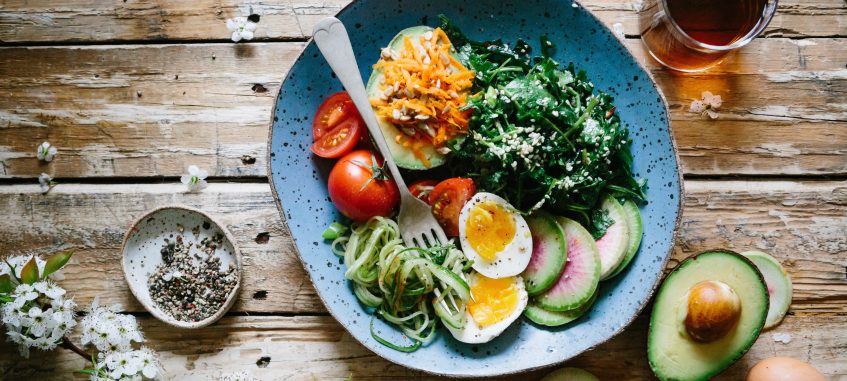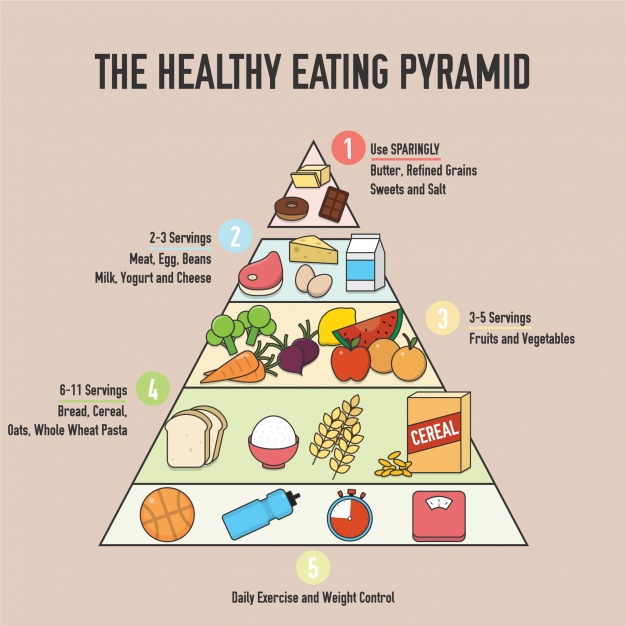The Ultimate College Student Grocery List to Be Healthy and Fit

The Ultimate College Student Grocery List to Be Healthy and Fit
You may have heard of the Freshman 15? Though not exactly a myth, it is a bit of an exaggeration since studies show that the average weight a freshman actually gains is between 2.5-3.5 lbs.
On the other hand, fifteen percent of college students reported weight loss. For students their appearance is usually more important than their health. However, the way people look is directly related to the way people feel. This leads us to the questions:
- How to be healthy and fit when studying in college?
- What should be on college student grocery list?
Basic Food for College Students
Checking out a nutritional food chart below can give you a starting point of what you need to eat each day and how much of it you should ideally include in your diet.
Barring allergies, a food chart can help guide you to finding the right combination of:
- grains
- fruits and vegetables
- proteins and fats
- oils and sugars

Please note:
Competitive athletes who engage in strenuous daily workouts and competitions should consult a nutritionist to make sure they’re obtaining the right level of nutrients to maintain their performance and health.
So, now, when you know the fundamentals, find out what exactly should be on a college shopping list.
Breakfast Foods
First meals first ? Many students refuse from having breakfast because they simply not having enough time in the morning. Below, you’ll find the items you should include to your grocery list for breakfasts that easy to make.
- Eggs are a great breakfast food for college students. Full of protein and vitamin B12, essential for proper brain function, eggs are a college student’s best friend.
- Granola is a great way to start the day, but not if it’s loaded with sugars and oils. Museli, a lighter version of granola without the fats and oils is a good option with yogurt, milk or your choice of nut milk. The fiber in the grains and dried fruits help promote healthy bowel function.
- Pancakes — Try a whole grain version or one that uses yogurt instead of milk for a healthier variety. Whole grains release energy more slowly over time so wheat or another whole grain flour will give you longer-term sustenance than white flour pancakes.
- Bagels and lox — There’s a reason why the most competitive city in the world (New York) has bagels and lox for breakfast. A whole grain bagel with low-fat cream cheese and smoked salmon is a powerhouse of a breakfast. The whole grain bagel with give you slow-release energy throughout the morning while the low-fat cream cheese will provide some calcium and protein. Salmon is rich in protein and omega-3 fatty acids that help improve memory and cognitive function.
Here’s an infographic that will help you to memorize the key points better:
Key Items for a College Student Grocery List
Next time when you go to the grocery shop, don’t forget to add the items you’ll see below.
Fruits and vegetables — All fruits and vegetables in general can contribute positively to your diet, but some even more than others.
- Blueberries have been touted as “brain food” for more than a decade now because of their high levels of vitamin C, vitamin K and gallic acid which promote healthy brain function.
- Avocado is high in vitamin K and folate which help improve cognitive function. They’re also high in vitamin B and vitamin C, high in protein and low in sugar.
- Beets enhance blood follow to the brain, which helps improve mental performance.
- Broccoli contains high levels of vitamin K and choline, which help improve memory.
- Leafy greens such as spinach, kale, Swiss chard and romaine lettuce are rich in vitamin A and vitamin K which benefit brain function.
Lean proteins — Red meat can have its place on a college student grocery list, but most of your protein should be coming from leaner meats such as fresh fish or chicken. Red meat can be consumed on occasion, but not every day as it’s difficult to digest and the fat in red meat can put a strain on the heart and arteries. Lean proteins that digest more easily free up the body’s energy to focus on other things, like studying!
Fresh juices — While fresh fruits and vegetables are great, fresh juices should also have a place on your college grocery list. Because juices don’t include the fibrous material that a piece of fruit or vegetable have, the body is able to absorb their nutrients more directly. When you need a mental boost, skip the coffee and have a ginger carrot juice or blueberry banana juice to increase mental function and energy levels without having to deal with the caffeine highs and subsequent crashes.
Water — Water should be at the top of a grocery list for college students, actually. It’s essential for proper brain function and dehydration actually has some dire effects on the body, including bloating and weight gain as well as on the brain. Did you know that dehydration can significantly lower your memory and cognitive skills? The golden rule when it comes to water is 8×8 (eight glasses of eight ounces of water) per day. This should be taken in throughout the day, not all in one go, in order for the body to be able to absorb the water and process it. So make sure you add water to your list when heading out to the store.
Healthy dorm snacks — Make sure you keep healthy snacks on hand. Otherwise you’ll be tempted to load up on unhealthy snacks when you’re in a pinch. Whole gain cereal bars, unsalted trail mix and dark chocolate all make for great snacks when you need something to munch on between meals.
Tea — Many teas have excellent properties that promote health, including brain function. Green tea, famous for its antioxidant properties, also contains caffeine which can help keep you alert during morning classes. Chamomile tea can help calm you and make sure you get a good night’s sleep which is important for overall health and a necessity for proper brain function so make sure you put it on your college student grocery list.
In addition to avoiding the freshman 15, this college student grocery list can help you maintain proper brain function and energy levels to help you excel this semester.
Our Advantages
Quality Work
Unlimited Revisions
Affordable Pricing
24/7 Support
Fast Delivery